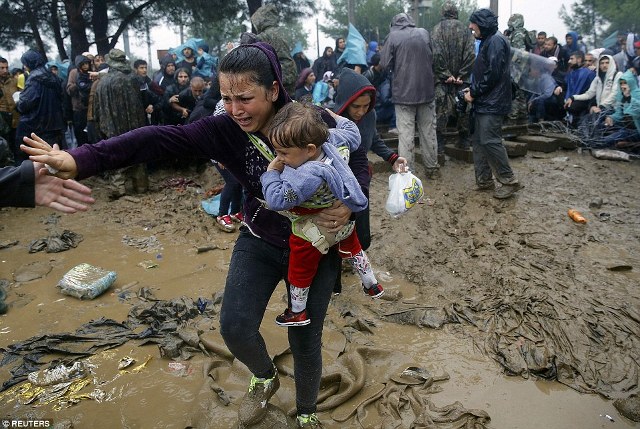Alwaght- Syrian asylum seekers who fled violence in their war-torn country are living a terrible life in Greece's refugee camps.
Thomson Reuters Foundation published a report on Tuesday, saying if refugees had known what it would be like living in a refugee camp in the Greek capital, they would never have left even their war-ridden homeland.
The report begins with the story of a 38-year-old Syrian man, Mustafa, who left Aleppo for Athens along with his wife Nadia, 37; but four months of living in a broken tent by Athens' Pireaus harbor and waiting for his asylum claim to be processed has caused them to bitterly regret their decision.
The couple left most of their family behind in Syria, except for Mustafa's parents who made it to a refugee camp in Turkey.
"Anywhere. Anything is better than this," he said as a tear trickled down his cheek.
"We didn't think we'd be here long but we've yet to have our first (asylum) interview," Mustafa told the Thomson Reuters Foundation.
"They've delayed it over and over again. At this rate we'll be here for years. Sometimes, I just want to take my wife's hand and jump into the sea."
More than 160,000 people have arrived in Greece by crossing the Mediterranean so far this year, almost half of them from Syria, according to the U.N. refugee agency UNHCR. The majority of new arrivals have applied for asylum in the EU.
To receive asylum in Europe, migrants in Greece must go through a rigorous process through EASO, the European Asylum Support Office.
This entails a minimum of two interviews in Greece, spread over several weeks or months, and then at least two additional interviews in their country of relocation.
"The time it takes for a relocation request to go through in Greece really depends on the member state in question. Some are relatively fast and some are not," said Iota Peristeri, who works at the Greek asylum service.
"You could be lucky and you're only in Greece for three months or so, or it could take much longer," Peristeri told the Thomson Reuters Foundation.
Syria has been gripped by foreign-backed militancy it blames on some Western governments and their regional allies including Turkey, Saudi Arabia, Qatar and the Israeli regime. The foreign-sponsored conflict in Syria, which flared in March 2011, has so far claimed the lives of nearly half a million people, over one million injured and an estimated 12.5 million now displaced.
Smuggled back to Turkey
The whole process can take months if not years.
And for those who arrived after the EU-Turkey deal in March, the wait could be much longer as EU member states continue to fill up their asylum quotas and become increasingly cautious about who they grant asylum to.
"The relocation process is so slow. I think life would be easier back in Syria," said Maha, 38, who left Aleppo with her three children in February after her husband died of a stroke.
Maha spent time in two refugee camps - one on the Greek-Macedonian border, the other by Piraeus port - before ending up in Athens' Eleonas camp, which hosts about 1,500 people.
Although she registered her and her family as refugees with EASO in March, they are yet to have their first interview.
"Being at Eleonas camp is the hardest part of my journey so far. I just want them to hurry up or at the very least send us back to Syria," Maha said.
"The food here is inedible ... but we have no choice but to eat it. A lot of people regret coming at all, and many are being smuggled back to Turkey."
While many asylum seekers like Maha are placed in official refugee camps, the majority are forced to sleep on the streets in Athens as they wait for their applications to be processed.
Those accepted on a relocation program are put in a house as they wait to be flown to their new home.
"I shared a house with several other guys ... It was pretty basic and missing a lot of things but I was thankful to have it," says Muhammad, 24, from Damascus.
"In the past, people applying to be reunited with their families also got them but they don't have enough houses so this has stopped. That's why so many people are sleeping on the streets."
Desperate and Depressed
When migrants arriving on Greek islands like Samos or Lesbos get the call for their first asylum interview, they must pay for a ferry to Athens. The journey is often very expensive for families who have spent their life savings getting to Europe.
These asylum seekers are meant to be provided with accommodation in Athens but this did not happen for Damascus-born Nama Abdullah, 28, and her three children who live in Kara Tepe, a refugee camp on Lesbos.
In May, Abdullah was told she and her family had an interview in Athens but unable to afford the 178 euro ($200) journey to get there, she sought financial help from other refugees. She said she received no help with accommodation.
"I couldn't afford to rent a hotel for the night and all the camps in Athens sent us away," Abdullah said. "Nobody helped us, no volunteers, nobody."
Altogether, Abdullah and her children spent two nights in Athens, the time it took her to raise the money to sail back to Lesbos. Again, other refugees funded her journey.
She will go back to Athens for a follow-up interview on Sept. 9.
"People are so desperate here, they'll really do anything," said Safi, a former NATO employee and translator. "Everyone is depressed here, myself included. Nobody ever feels good."
"I have friends who are saying they'll go back to join Al Qaeda or worse, because they feel like they have no other choice. And, you know what? I don't blame them."



























